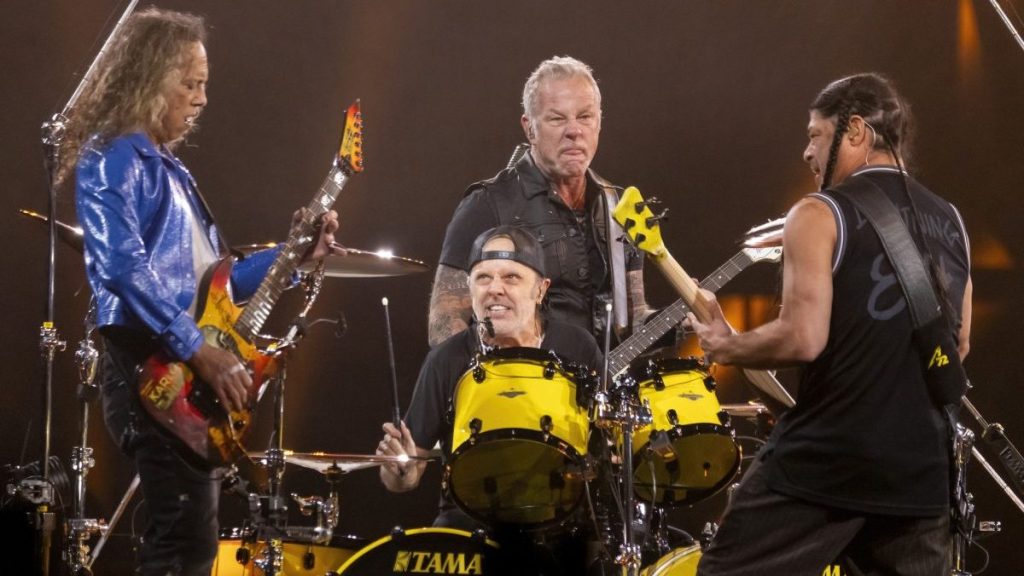In the annals of Canadian music history, Thrush Hermit were a blip on the radar in a decade ruled by Céline, Alanis, Shania, the Hip and the Barenaked Ladies. But to those who followed the Halifax band between 1992 and 1999, they were the coolest thing in Canada.
Introduced to the world as Sloan’s protégés, the Hermit were sometimes goofy, sometimes emo but always rock stars in the making, destined to follow in the footsteps of their mentors. But instead they broke up in 1999 while promoting an album of killer throwback rock that came two years too soon.
Videos by VICE
This year marks the 20th anniversary of Clayton Park, the band’s triumphant sophomore album that unexpectedly became their swan song. Emerging out of Halifax’s early ’90s indie scene, Thrush Hermit—Rob Benvie, Cliff Gibb, Ian McGettigan and Joel Plaskett—rose up through the ranks of Sloan’s murderecords label, graduating to an ill-fated major label deal with Elektra for their 1997 debut album, Sweet Homewrecker.
By the time Clayton Park came out on Sonic Unyon in February 1999, the band‘s days were numbered. And although they barely survived the year, the album went on to become a CanRock classic.
As Thrush Hermit prepare for a (second) reunion tour this fall and the long-awaited vinyl reissue of Clayton Park, VICE spoke to the band, as well as those involved in the making of their masterpiece.
It’s so strange to be involved…
Like many indie bands signed to majors in the ’90s alt-rock goldrush, Thrush Hermit’s deal with Elektra was a one and done. Both the band and label agreed to end their relationship after Sweet Homewrecker failed to find an audience.

Angie Fenwick [manager, 1993 to 1998]: US major label deals rarely work out, but we were fortunate to have had the best possible experience in leaving Elektra. Not only were we lucky enough to get out fast, we were also paid handsomely to do so.
Cliff Gibb [drums, 1994 to 1998]: What made Thrush Hermit so fun was the thrill of the chase, not the actual signing of a record deal. That was really only about money. We all wanted to be able to keep making music and touring without having to get full-time jobs. None of us were in it to become famous.
Joel Plaskett [guitars/vocals]: It became pretty apparent, pretty quickly after Sweet Homewrecker came out that we weren’t a priority. The album wasn’t even that well received in Canada. To be fair, we weren’t an easy band to sell. We didn’t want to be produced, we didn’t have a lead singer, and we weren’t responding to the pressures of how to present our band. I wouldn’t have prioritized us if I had worked there.
Ian McGettigan [bass/vocals]: Third Eye Blind and Sweet Homewrecker came down the pipeline basically at the same time. I’m sure it was like, “Well this I can fucking sell! And this? I don’t know what to do with!” I don’t blame them at all. We had no name in America, and it wasn’t like we delivered a zeitgeist-y, catchy song. “North Dakota” is a good song but it doesn’t blow out the speakers like that Third Eye Blind song does.
Rob Benvie [guitars/vocals]: Sweet Homewrecker is a funny album because it came off as a little stiff, it’s long and it doesn’t have tons of personality. It’s sort of hit and miss. We were really rehearsed and beat the songs to death and arranged the crap out of them. We had this money behind us so we treated our band like a job. Sometimes I listen to it and think, “Guys loosen up a little!”
A (neon) sign of things to come…
On tour in the US playing to near-empty clubs, the band decided to have some fun, introducing extended jam sessions into their sets. All of a sudden they were a lean, mean rock and roll machine with a fancy neon sign to prove it.
Plaskett: When touring Sweet Homewrecker we were getting stir crazy and coming up with these riffs on stage. We were listening to a lot of classic rock, like Sabbath and this band I had really gotten into called Cactus. We recorded this Budgie cover called “Nude Disintegrating Parachutist Woman,” but we didn’t put it on Clayton Park because it was sort of ridiculous. That was sort of where our heads were at: long classic rock songs that were fun as hell to play.
Benvie: When you’re adrift on your own, touring endlessly, you have to enjoy the music you’re playing. So that influenced the kind of music Joel and I started writing, which got loose and jammy with more guitar solos, to get away from the boxy alt-rock.
Plaskett: That neon “ROCK AND ROLL” sign was Ian’s idea but it sounded cool to us. So we did it because we recognized its spectacle. We’d seen a lot of shows where spectacle was part of it and we wanted that for our band.
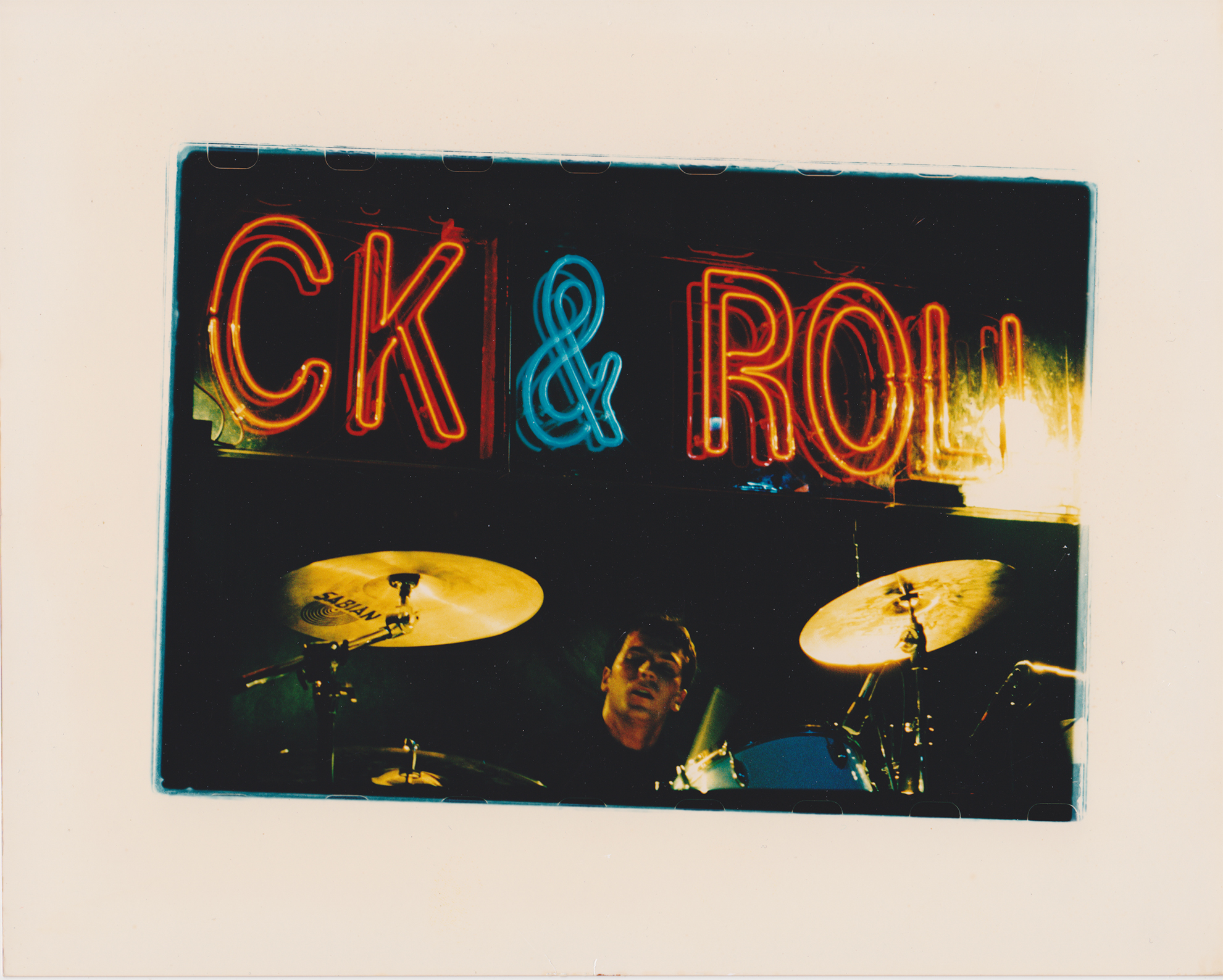
McGettigan: That was a great example of what it was like to have $400,000 in the bank. We had to get it custom made in Dartmouth and it cost $3,000. That sign really set the stage for what would become Clayton Park.
Benvie: That was 100 percent Ian. But Cliff designed the control box so that the components—ROCK, AND, ROLL—could have three settings: on and off, individual parts flashing, or they could flash in sequence.
A trip to the Gas Station
Using money left over from their Elektra payout, the band drove their Winnebago to Toronto to record the next album. They holed up in the Gas Station, run by Dale Morningstar, a go-to engineer for the city’s local indie scene.
Benvie: The Inbreds had done an album with Dale and I remember Mike O’Neill recommending him. But I think a lot of it was finding a set up where we would feel at home that wouldn’t cost a lot. One of the things we spent Elektra money on was new gear, so we were already pretty deep into recording ourselves in our space in Halifax.
McGettigan: There was another studio [Chemical Sound], the one where Sloan did the “Money City Maniacs” record [ Navy Blues]. The record definitely would have sounded different had we done it there. But we went with the $100-a-day studio as opposed to the $400-a-day studio. I think the record cost about $7,000 to make at Dale’s.
Dale Morningstar [engineer, co-owner the Gas Station Studio]: They had sent me a cassette a couple months in advance. I was out camping in Prince Edward County a few days before they arrived, and I played the cassette on this crappy ghetto blaster, thinking, “This is done. How am I going to improve this?”
McGettigan: At that point we had done a lot of studio stuff ourselves. When we did Sweet Homewrecker we bought a pretty nice eight-track in Nashville and we had become pretty good with using that. So we knew quite a bit going into the studio. Dale was more about giving gentle suggestions.
Morningstar: Yeah, I was more of a knob jockey than a producer. Those guys were very clear about what they were after. There was nothing I really had to do except get them a good sound and document it. They had a job to do but they were still lots of fun.
Gibb: I loved the laid-back feeling of being in that warehouse space. At the risk of sounding corny, I also remember noticing the magic that was spontaneously happening in what was being created. There were several things that just happened on the floor and we just left it.
Plaskett: We were just more relaxed as a band. We didn’t have a major label breathing down our necks. We made the record on our own terms completely and then went looking for a home for it.
Gibb: As always there was a bunch of down time, so I was practicing jiu jitsu and wrestling Ian, out of boredom, which inevitably ended in a stalemate. We also spent time roof surfing on our Winnebago in the streets around the studio.
Morningstar: We’d go down the street from the studio, which was in this derelict warehouse in Liberty Village, have some beers and talk about the Rolling Stones and stuff like that. Then we’d drive around in the Winnebago with Ian standing up on the roof.
McGettigan: I remember doing a lot of insane stuff like that as a young man.
Benvie: Ian’s mom lived near Toronto, in King City, and we crashed with her. We parked the Winnebago in a field near her house every night after recording. We drove that thing from King City to Toronto and back every single day.
Morningstar: At the end of the sessions they were trying to see if I’d accept the Winnebago as payment. It would’ve been awesome, but I knew how much gas it took so I had to take a pass on that.
Fenwick: There was definitely a feeling of freedom recording Clayton Park that wasn’t there during Sweet Homewrecker. It felt good to be back on Canadian soil while recording Clayton Park. Staying with Ian’s mom was also a much needed boost after the brutal Sweet Homewrecker tour.
Nobody complains and no one is resentful…
As the band’s sound changed, so did the songwriting duties. Joel took on more of a role as the band’s primary singer and songwriter, leaving Rob to question his contribution to the band.
Benvie: I wrote a bunch of songs for the album, but they got cut. I certainly remember the feeling, “Oh this stinks. I don’t have my usual half amount.” But I went along with it.
McGettigan: Rob had some demos but it’s not like we just shot them down. By that point I think Joel kinda knew he was in for a whole life of this, whereas I don’t know if Rob was like that.
Plaskett: We can talk about there being some friction between Rob and I, because there was. But at the same time there was this awesome push and pull that made the band what it was. By and large we came to Clayton Park in a collective way.
Benvie: There was always tension as in friendly competition. We never had a constitution in Thrush Hermit where we would veto something, but Joel was always more confident with his songs than I was. He’s a very persuasive, charismatic, intelligent guy, so if he had a vision he was ready to pursue it and advocate a stance, in a way that maybe I wasn’t as secure in doing.
Plaskett: The funny thing is there is a version on the box set of “From the Back of the Film” that Rob and I did on a four-track back when we were 19. It was this fucked up, classic rock meandering written when we were trying to sound more like Sloan. Then when we made Clayton Park we thought that song could be fun. We dug into it and it came out super fast. Lo and behold it was the first single.
Benvie: I think we had a sense that we made a good album and had evolved into the kind of band we had hoped we’d be. The fact that the songs were a little louder and not three-minute pop songs made them better to play live.
Plaskett: The nature of that record was that I was pushed to the frontman role. Rob didn’t write as much but he contributed in a big way. He and I always connected as songwriters. We would drive around and talk about stuff, think about songs together, share ideas. His prolificness really lit a fire under my ass to write. We even began to experiment with me singing some of Rob’s songs.
Benvie: We had a pretty constant ongoing back and forth of playing each other songs. Ian also wrote some songs, but most of the time it was Joel and me.
McGettigan: I didn’t really write that many songs. Those guys really encouraged me to write more, but they’re such good songwriters that I didn’t feel like putting much effort into it.
Plaskett: Ian wasn’t as much of writer, he was more the ideas man as far as presentation. Like the artwork for Clayton Park was his. The neon sign was his idea. Not to count Cliff out, but he wasn’t a writer. He just loved playing drums.
We are being reduced…
As the Clayton Park sessions wrapped up, Cliff announced he was leaving the band for a more stable 9 to 5 job. Due to health concerns, Angie also resigned as manager. They were replaced by Benn Ross and Colin MacKenzie, respectively.
Fenwick: It was really hard for Cliff to leave after making that awesome record. He considers the songs on Clayton Park his personal best recordings. Cliff loves Rob, Joel, and Ian like family. He found touring really hard though.
Plaskett: Cliff was offered a job and saw the writing on the wall. He wanted something more stable and Angie was no longer our manager. They were married and had their own concerns to look after, moving forward as a couple.
Gibb: The decision to leave was hard because I loved those guys and playing drums had been a big passion since I was a kid. I especially found it hard to be away from home, though, because I have an amazing home life. When the Hermit was home from the road, I would work with some friends on an online multimedia magazine and that lead to a great job offer. It was the right thing at the right time.
Fenwick: It was particularly difficult for me to council him, being both the band’s manager and his wife. I remember telling him if he decided to take the job, he’d better make peace with becoming the Pete Best of Thrush Hermit. As it turned out, I was extremely thankful that he did take the job. He was home to support me when I got very ill not long after.
Gibb: In a way, it felt to Angie and I that it was a big risk to take this full-time job working for a corporation, but my heart was telling me it was the right move.
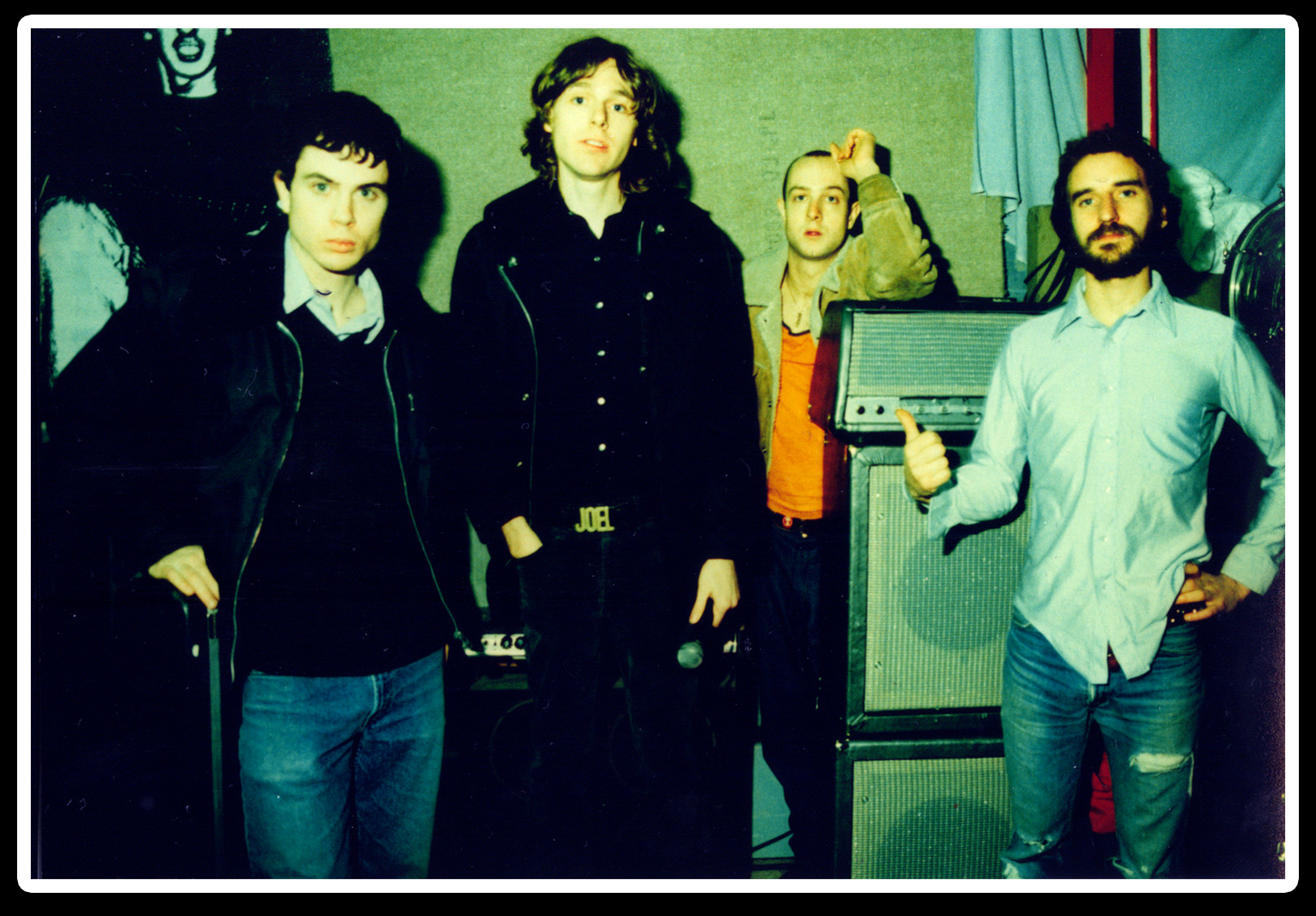
Benvie: Benn was the first guy we thought of when Cliff left because Cliff had long ago been in a band called Weasel Faced Judge, a legendary Halifax psychedelic rock band. Benn had replaced Cliff in that band, so when Cliff left we immediately thought, “Let’s ask Benn Ross.”
Benn Ross [drummer, 1998 to 1999]: When Joel called and asked me to play drums, I was under the impression that the gig was just for the summer. I played often around that time with Al Tuck, the Flashing Lights, so we were all aware of each other.
Benvie: Benn was a full-time member of the band and involved in the music, but he wasn’t quite involved with the direction of the band. And I think he was happy to stay out of it and just be the drummer.
Plaskett: When Cliff left, I think that changed things for Rob. And that’s not to discredit Benn. We became a fierce live band with Benn and could jam in a way that we didn’t with Cliff, because Cliff loved rehearsed music.
Benvie: I loved playing with Benn Ross. Lots of amazing things happened after he joined. But Cliff leaving was the beginning of the end of prime Thrush Hermit for me. Joel, Ian and I were childhood friends and we had this language and weird unit to the three of us. Cliff came in and brought this refreshing energy to the band. Cliff leaving was heartbreaking but we understood.
Colin MacKenzie [manager, 1998 to 1999]: I’d known the guys for a while. Basically Angie lined everything up for me. She had the ball sitting on the tee, ready for the hole-in-one, because this was an awesome record. So Angie had done all of this work, but then became sick and felt she couldn’t get the record out the door. I just made sure nothing went off the rails.
Greetings from Clayton Park
Thrush Hermit’s second album, Clayton Park , was released by Hamilton indie label Sonic Unyon on February 23, 1999. The album was immediately championed by new and old fans, as well as campus radio, where it spent almost the entire year at #1 on the charts.
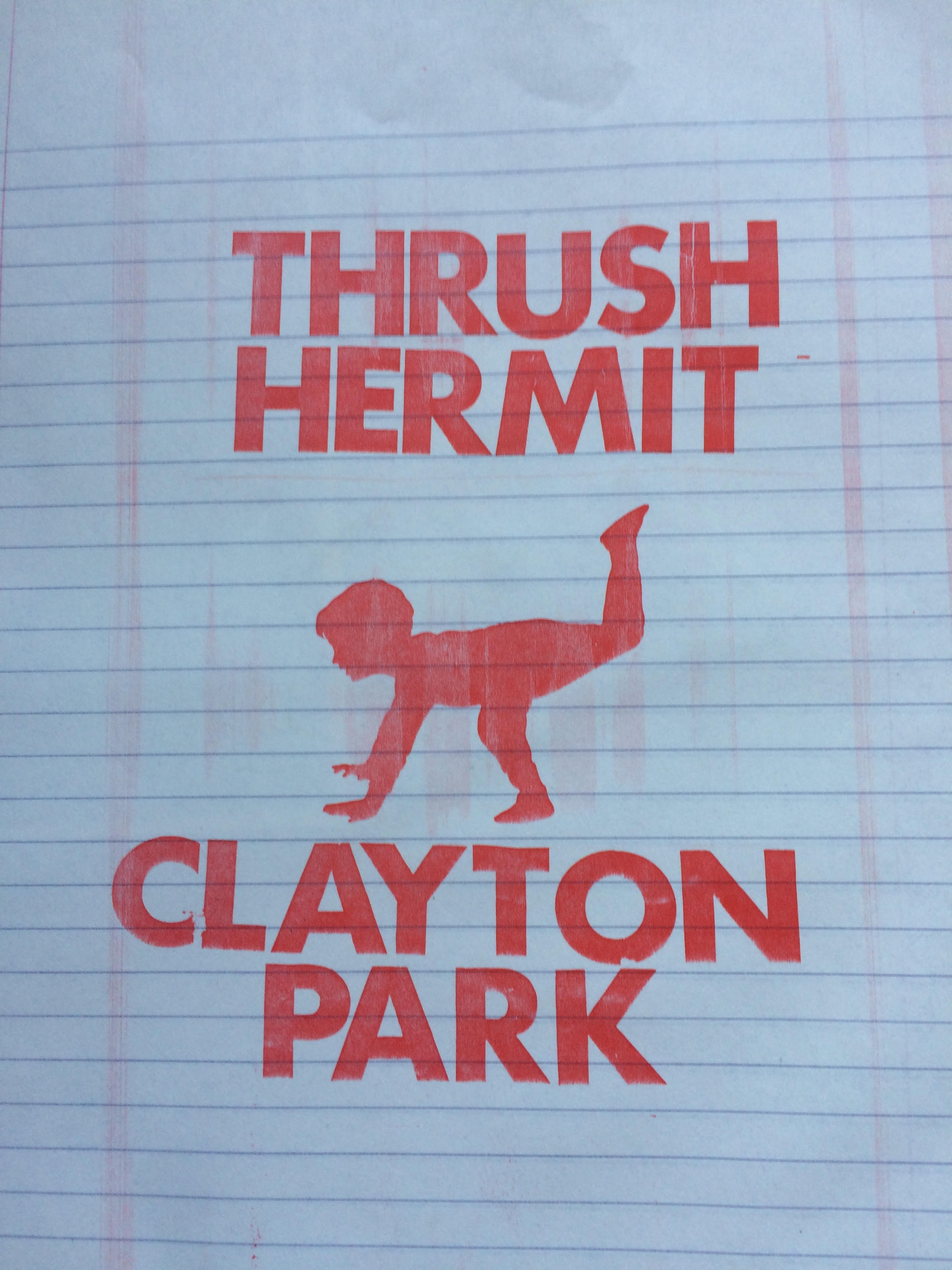
Plaskett: Ian, Rob and I all grew up in Clayton Park, this suburb of Halifax. A lot of our references and inside jokes, even to this day, go back to Clayton Park.
Benvie: The original joke was that we were gonna call it Greetings From Clayton Park, like Springsteen’s Greetings From Asbury Park, but we didn’t because Cliff was from another part of town. Then Cliff quit so we had carte blanche to call it whatever we wanted. It was part of our ongoing way of self-mythologizing ourselves and maybe trying to embrace a suburban rock aesthetic.
McGettigan: I lived on the border of Clayton Park and Fairview. We all hung out in Clayton Park, but those guys were actually from Clayton Park. I was from the other side of the tracks.
Benvie: We definitely didn’t have any label attached at first. We paid for the album ourselves. There were some other labels we were still talking to, but we knew the Sonic Unyon guys from way back when.
Plaskett: We had played shows with Tristan Psionic, so we were fond of them as people and they seemed to have their shit together as business people. They had momentum at the time and the scale of it seemed right for where we were at. It was a come down in some respects to go back into the indie world, but it was also quite liberating.
Mark Milne [Sonic Unyon co-owner/general manager]: I remember when their Elektra album came out and it wasn’t doing well we were thinking, “That’s incredibly sad because they’re such a good band and they work so hard.” We really wanted to put out their next record when we heard they were looking for a label.
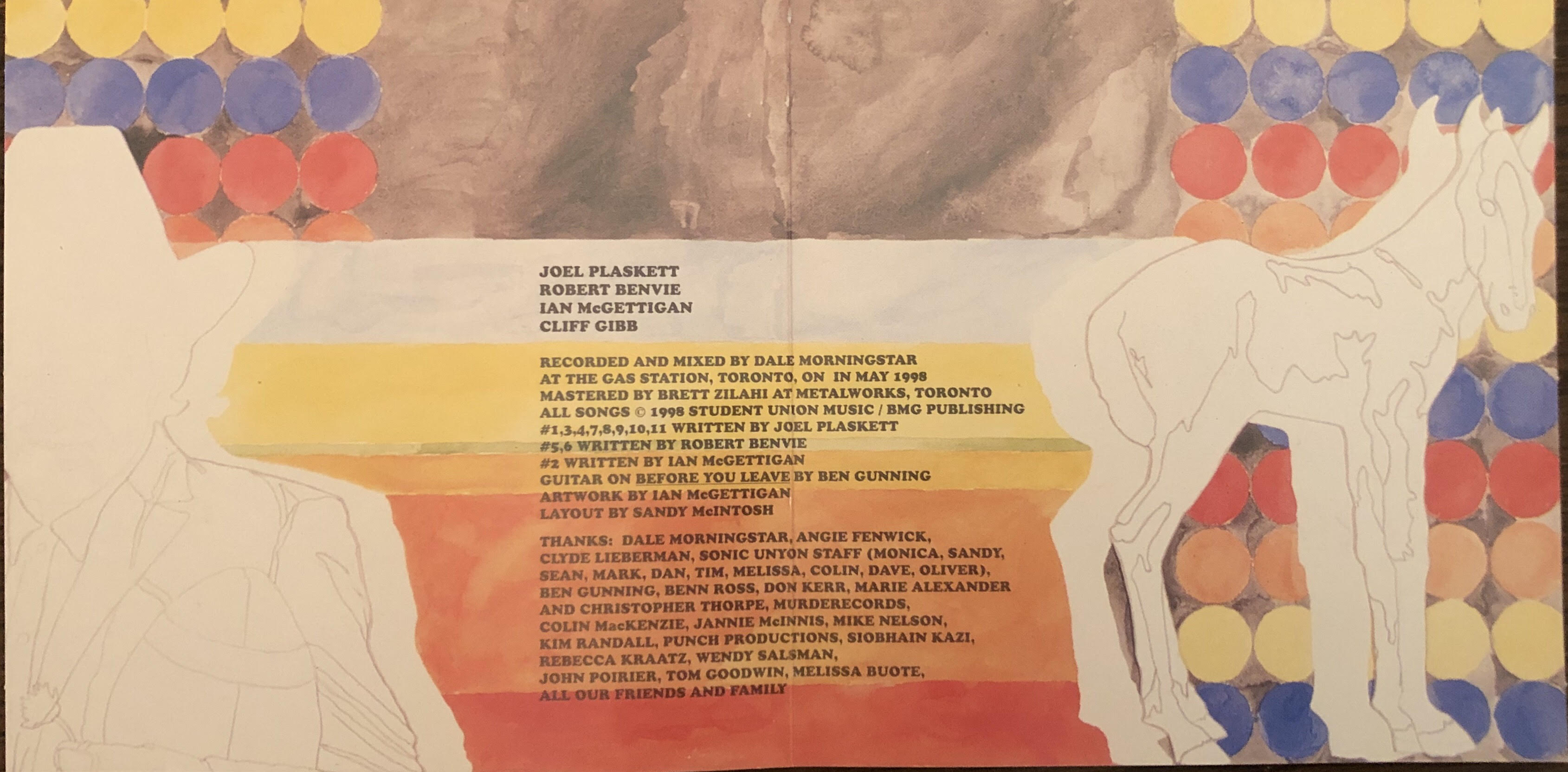
Monica Watson (née Bielke) [Sonic Unyon label manager, 1998 to 2000]: Thrush Hermit had their own loyal fan base, but so did Sonic Unyon. Clayton Park was able to capitalize on both for the initial release.
Sean Palmerston [Sonic Unyon publicist, 1997 to 2013]: The album cover was supposed to be the inside sleeve painting with the horse, and Monica didn’t like it. She was very hands on so she convinced them to put the red and white painting on the cover instead.
Watson: When we got the artwork the consensus at the label was that the images worked better reversed. I was the one that got to make that call and propose it as a suggestion to switch them.
McGettigan: I don’t remember that at all. Maybe at the time I was like, “Sure. I agree!” They were the record label, so if they thought it was stronger with the different visual then no problem.
Watson: Everyone at the label had high hopes for the record. Reviews were good. Sales were solid. Actually better than solid. I remember the album was well received at campus radio.
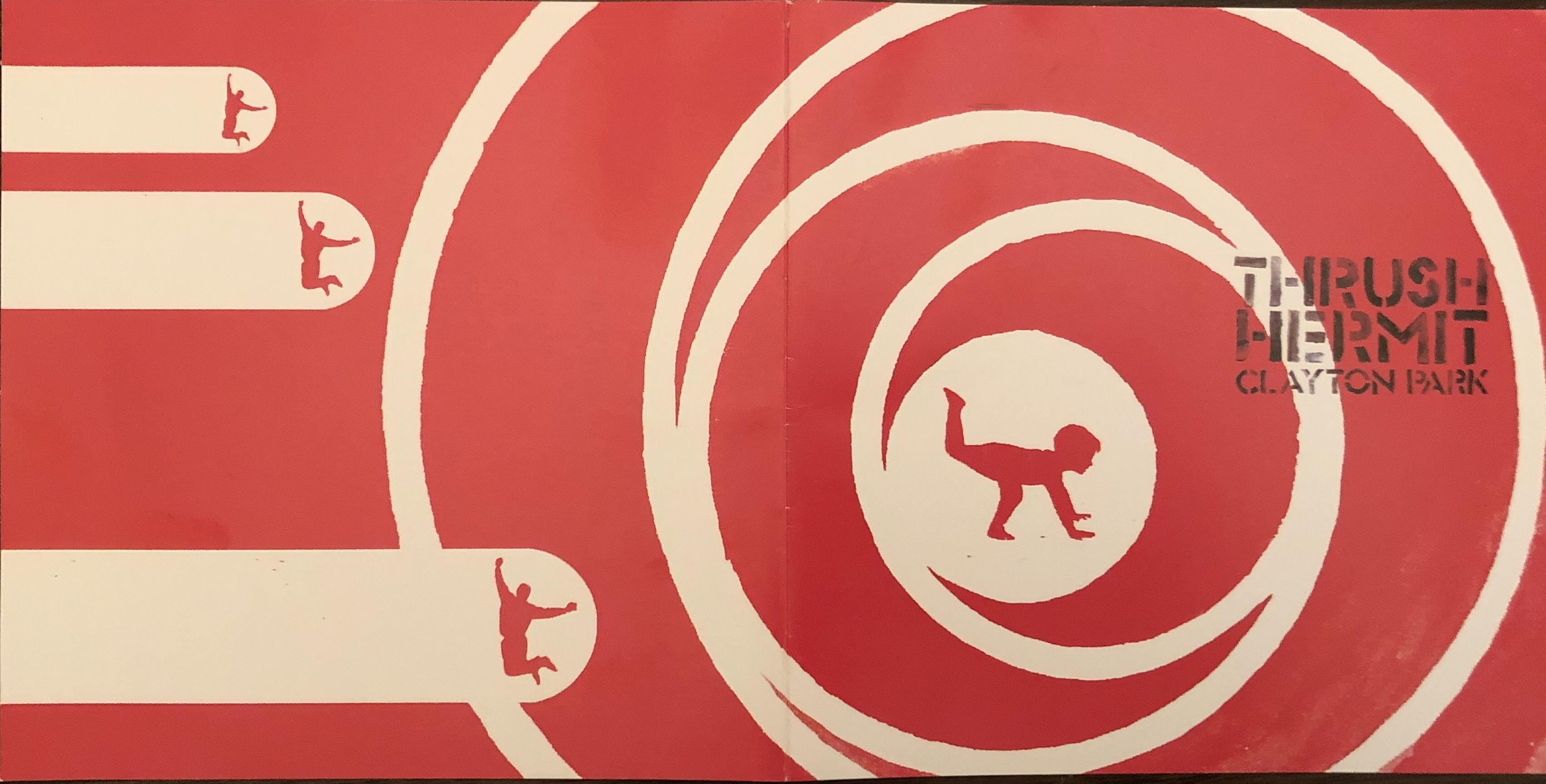
Palmerston: They made a video for “From the Back of the Film,” which MuchMusic added into rotation right away. That definitely helped right off the bat. The record ended up being the number one record on Canadian college radio for the entire year. I sent it to 300 campus radio stations in the States but I think it only made it to number 152. We couldn’t even get a mention in SPIN or Rolling Stone, which was so disappointing.
Plaskett: Clayton Park did build some momentum and had some success, especially compared to Sweet Homewrecker. All of a sudden we were digging into the classic rock leanings really heavily. I like to think we were foreshadowing that resurgence that came when the 2000s hit.
MacKenzie: I remember saying, “Okay, if we’re gonna do this, let’s think about the live show. Other than the neon sign, how are we gonna give people an experience?” And Ian learned how to breathe fire. It was just such a surprise for people to see. He definitely burned himself a couple of times, and yet that didn’t stop him. He was definitely all in to rock.
McGettigan: I was trying to amp up the live antics. We were on tour with the Local Rabbits in Winnipeg and I bought a bottle of the strongest alcohol I could find. I went back to the weird dormitory we were staying at and practiced spewing water into the air for a few hours. Then I wrapped some toilet paper to a drumstick and took a giant swig and boom! It made the inside of my mouth peel off. I remember playing somewhere in Hamilton and doing a huge one, looking up while I was doing it and the fireball hit the ceiling, fanned out and disappeared. I thought, “Maybe this isn’t the best idea.”
Growing on you but wearing on me…
In the summer of 1999, Thrush Hermit began working on new songs, none of which ever materialized. After the band were forced to cancel a fall tour due to illness, Rob decided to quit the band. They finished off the year with a quick farewell tour in December and broke up right as the 1990s came to an end.
Benvie: My weariness began when we were working on songs for the next album. I wasn’t really enjoying the new stuff, but it sorta overlapped with our shows getting more triumphant and audiences getting bigger. I knew there was an end date on this because I didn’t really want to make another album.
McGettigan: It wasn’t like there was a shitload of songs that signalled what the next direction would be. Joel was really going for it, and Rob wasn’t having much fun. I was in the middle, like I had always been, so I was cool with rolling along with whatever. I was starting to play with other people and produce some stuff. It wasn’t like I had to be in this band. I don’t recall it being really heartbreaking. I do remember Rob saying, “I don’t want to do this anymore,” and me thinking, “It’s all good!”
Plaskett: I was writing a lot of different kinds of stuff and knew my love for Vic Chestnutt and Gillian Welch wasn’t going to make sense on a Thrush Hermit record. I made In Need of Medical Attention before we did Clayton Park and I sat on it. And then in September I released it on a label called No Alternative and played CMJ in New York. We had this tour with Local Rabbits and the Flashing Lights scheduled for October, and the day before I was feeling run down so I went to the doctor. I mentioned the tour and he said, “I wouldn’t recommend that. If you catch a cold you could die.” So I told the guys and we pulled the plug on the national tour.
Benvie: When we cancelled the tour, it really put the brakes on the momentum. So sitting around for those six weeks, the corrosion started to seep in. Like, “I don’t want to go to the space and jam with these guys because we’re not agreeing on where we’re headed musically.”
Ross: I don’t recall actually hearing that Rob wanted out of the band. Joel, Ian, and I had a jam or two without Rob which I thought was a little odd. But, to me, it just seemed like Thrush Hermit jamming Joel tunes without Rob.
MacKenzie: I have a long history of supporting bands that don’t necessarily want to be there. I was trying to make it work. But when things started falling apart, it was too hard to hold it together.
Benvie: I quit and left it to them. We were still friendly, but we had announced a short tour that would be our last hurrah. We knew that when it was over the whole thing needed to be over.
Plaskett: We planned some dates in December. Delaying it those months was definitely a drag for Rob. It was a real awkward ride to the finish line. So we did those last shows and they were great, but it took a little longer than probably everyone had hoped. The end of it was kind of challenging.
Ross: The sense of dissatisfaction within the band was becoming very apparent. I felt like I was some random guy sitting in watching a family collapse due to some deep-rooted communication ailments.
McGettigan: Our final gig was in Halifax. I don’t really remember being depressed after the band ended. I just rolled into a whole other world of stuff.
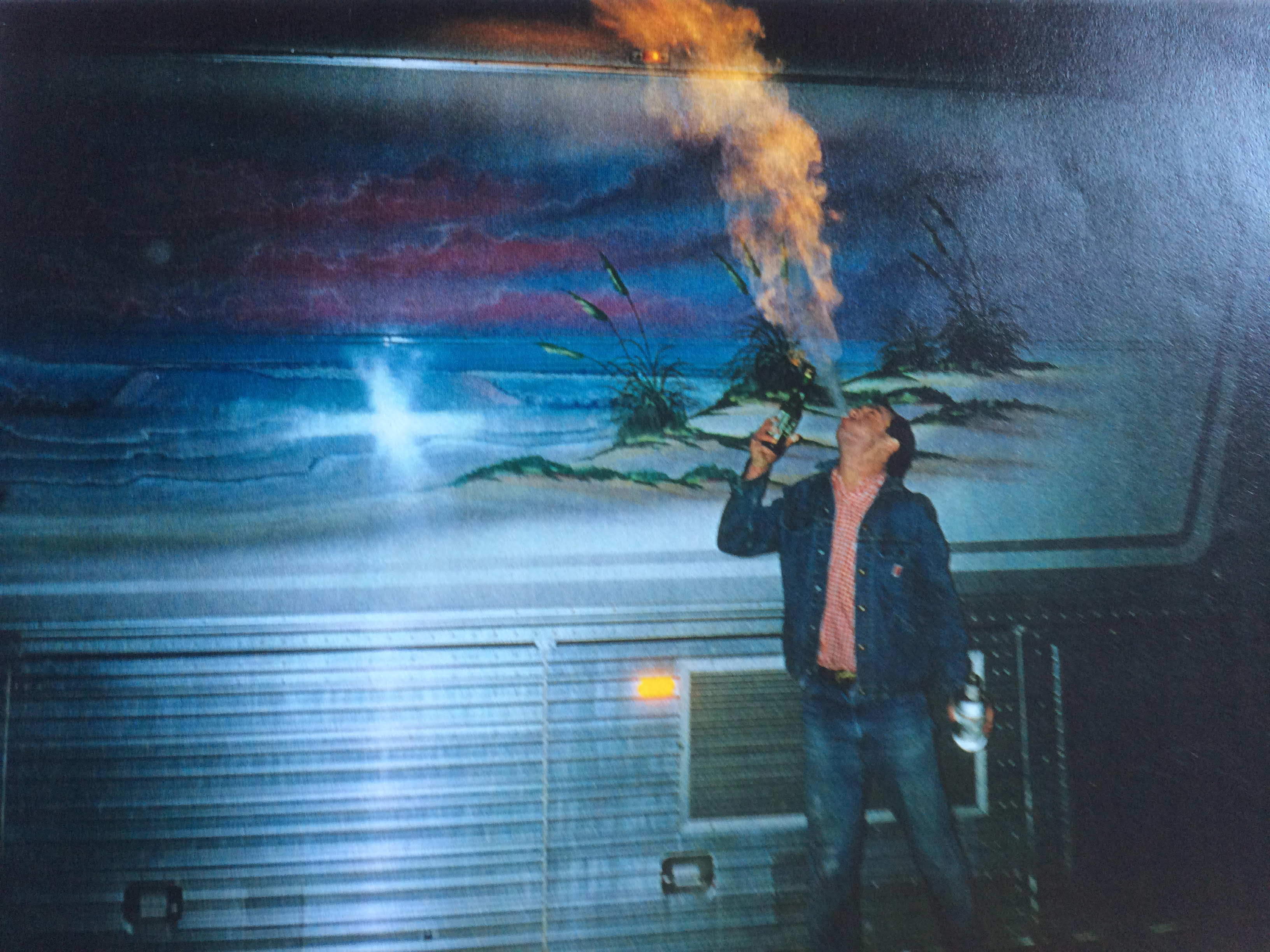
Plaskett: We finished on December 11. Then on New Year’s Eve, I went to Tim Brennan’s, who became the bass player for the Emergency. Tim and Dave Marsh had played together, and when I knew the Hermit was over that became the Emergency three-piece combo. I didn’t have anything else, like a university education. It was just survival instinct. “Fuck, I can’t stop playing music!” So I was just determined to keep doing that.
Ross: I really appreciated the stage time and experience playing with a band that people wanted to see and hear. I do wish that we recorded some tunes in the studio.
Plaskett: Ian, Rob and I had all been playing music together since we were 14. We were basically joined at the hip. The band ending was bittersweet. I think if Cliff had stayed then that balance may have retained itself longer. It may not have made it any better though. Things happen for a reason and we ended on a strong record.
Milne: I was disappointed, obviously, but I understood. I think they kinda saw how far they had gotten and were okay with that. Ironically, I think if Clayton Park had come out at a different time it would have done a lot better. I think it was ahead of its time, to some extent. Maybe if it came out when the Strokes were around things would have been different.
Palmerston: I lived and breathed Clayton Park and [Tricky Woo’s] Sometimes I Cry for the entirety of 1999. I think if those records had come out two years later they would’ve been absolutely huge. They both ended up as finalists for Alternative Album of the Year at the 2000 Juno Awards. But then Julie Doiron and the Wooden Stars beat them. I don’t think anybody thought Thrush Hermit wouldn’t get it.
20 all right
Thrush Hermit celebrate Clayton Park ’s 20th anniversary with a vinyl reissue through Joel’s New Scotland Records for Record Store Day and a brief reunion tour in the fall. Despite not being available on streaming services, the album has found a new generation of fans hungry for ‘90s rock nostalgia.
McGettigan: In 2009, I was on vacation in Europe with my family and I went to get some money out and my bank account was re-upped by thousands of dollars. It was SOCAN day so I looked at my report and the money was from radio airplay for “(Oh Man!) What To Do?” in Australia? SOCAN told me that Triple J radio was playing the shit out of the song in 2007. It was such a bizarre thing, a song that wasn’t even a single, blowing up on Australian radio eight years later.
Morningstar: People still ask me about that record. Every year some band will reference it and say, “I’d like to record with you because I grew up with Clayton Park.” More than most records, people will come up to me and ask about that one.

Plaskett: It’s our best work in the sense that it represents the looseness that we always aspired to but took a long time to achieve. Up until Clayton Park, our live show was always a way more joyous and free form of performance than our records, like Ian breathing fire or rolling around and playing an entire Steve Miller Band set. So I think even though it’s more of a throwback and even more serious in ways, Clayton Park also celebrated that joy of playing.
Gibb: To me, Clayton Park is the most cohesive of our records. The songs stand up really well and are our best live performance songs for sure.
McGettigan: I think it is the strongest statement by the band. The others were EPs, so it’s obviously a better record than Sweet Homewrecker, which makes it the best record by default.
Milne: It’s one of my favourite records that we’ve ever put out and a piece of Canadian rock history. Really, it’s that’s good. I’m biased, but in my opinion it’s in the Top 50 Canadian albums. It’s still in our top five best-selling records to date.
Benvie: In many ways I like Smart Bomb more. It’s so revved up and adolescent and pure. We were writing songs about being nostalgic for our teenage years when we were still actual teens! Clayton Park is pretty good though.
Plaskett: A lot of what is important to me about Thrush Hermit is that we were friends and we still are friends. I felt like I was in the Who or something with those guys, because I was 19 touring around the States, playing in the best band in the fucking world. Even though everyone else disagreed, I didn’t care.
Follow Cam Lindsay on Twitter.
Sign up for the VICE Canada Newsletter to get the best of VICE Canada delivered to your inbox.
More
From VICE
-

A waterfall in Sungai Tekala Recreational Forest, Hulu Langat, Selangor. Photo: Zaki Mohamed / Getty Images -

Photo: Catherine Falls Commercial / Getty Images -

Photo: RYosha / Getty Images

